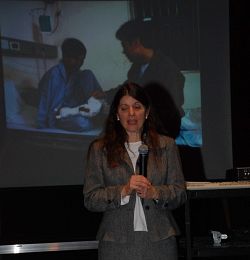Journalist tells students the hard facts about Chinese imports

OGDEN — Loretta Tofani is a Pulitzer Prize – winning journalist, whose last story, a freelance piece she wrote for the Salt Lake Tribune, was a six-part series on the working conditions in Chinese factories. It turned her into an activist – "the kind of writer who comforts the afflicted and afflicts the comfortable," she said. Oddly, it wasn't journalism that took her to China in the first place; it was her desire to open a small boutique, "The Elegant Asian," with furniture from China and other Asian countries. As an American furniture buyer, she was invited by the manufacturers to tour the factories in which the furniture was made. What she saw there "changed my life, my goal, and my meaning," she told an audience Jan. 10 in the Black Box Theater at St. Joseph High School in Ogden. "I came home, closed the business, and began writing," she said. Tofani has 25 years of journalism behind her – nine years with the Washington Post, and 14 years with the Philadelphia Inquirer, based in Beijing, China, as well as one year with the Associated Press Wire Service. She won the coveted Pulitzer Prize for a story she wrote for the Philadelphia Inquirer about prison inmates, many of whom had been charged with crimes but not convicted, who had been raped in prison. "But as a business owner from America, I had real freedom to tour the manufacturing plants to see where the furniture I would be selling was made. What I saw were what I know will be uncomfortable facts for American and European markets. "We all want to buy expensive-looking furniture, but here in America, we want to buy it cheap," Tofani said, standing before a large screen on which she showed slides of some of the workers in China. There were those who had lost fingers and hands to the machines they worked on, and those whose respiratory systems are forever compromised because they worked in unventilated factories where chemicals and glues were inhaled and no masks were provided. "I was taken with the conditions I saw and the people I met," said Tofani, who always thought of journalism not only as a way to make a living, but also as a vehicle for social change. "I found myself thinking like a reporter again." In one day, said Tofani, she was taken to six different factories. "There was always paint in the air, much of which I'm sure contained lead. But from outside these factories, no one sees these workers. The Chinese are making American products, and they're suffering for it." She toured factories where shoes, artwork, flowers, toys, and auto parts were being produced for export to the United States. In one factory, six workers stood all day at a glue table, maskless. The smell of the benzene-based glue was thick in the air. "Benzene is a well know carcinogen," Tofani said. "The United States imports from China more than $3 billion in merchandise," said Tofani. "Although the plight of Chinese workers has been well documented, we consume these goods at the expense of the workers and their health. They are losing limbs to the machines and dying young." She showed slides of some of the machines being used, and there were no signs of any safety guards, which we would see on the same machines used in the United States because such safety implements are required by OSHA (the Occupational Safety and Health Administration). Between November 2006 and June 2007, Tofani made four trips to China, each time talking with dying workers, those who had suffered lost limbs and amputations due to wound infections. Each person she talked with led her to another person or provided her with another wounded worker's cell phone number. She listed every factory name and traced their export routes. "All of this showed me the big picture," Tofani said. "I have stories of injustice, all of which can be traced to Chinese factories producing goods for American export. These people are exploited so we can buy their goods more cheaply than if they were made here in America." After Tofani's presentation the questions came. "What can people like us do about this injustice? "The traditional policies we have used to import goods into this country have to be changed," she said. Later, she elaborated on that comment for the Intermountain Catholic. "We should all work to get our trade agreements changed. Just as the U.S. does not allow the importation of goods that have been made with prison labor or child labor, so too we should amend our trade laws to prevent the import of goods that have been made with high levels of carcinogens or other toxins," Tofani said. "Usually products are made in this fashion because the factory doesn't want to invest in the expensive engineering and protective systems required under U.S. OSHA laws. We should all make this an issue and talk to our Senators and Congressional representatives on this point."
© Copyright 2025 The Diocese of Salt Lake City. All rights reserved.

Stay Connected With Us